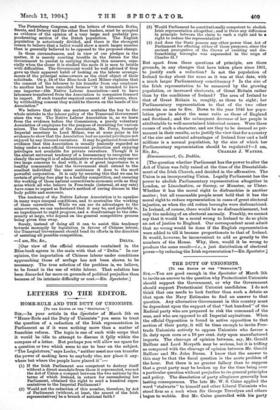LETTERS TO THE EDITOR.
HOME-RULE AND THE DUTY OF UNIONISTS.
[To THE EDITOR OF THE " SPECTATOR."]
Sra,—In your article in the Spectator of March 5th on "Home-Rule and the Duty of Unionists" you seem to treat
the question of a reduction of the Irish representation in Parliament as if it were nothing more than a matter of franchise reform. The topic is one of such wide scope that it would be lidle to attempt to discuss it fplly within the compass of a letter. But perhaps you will allow me space for a question or two which seem to me to bear on the subject. "The Legislature," says Locke, "neither must nor can transfer the power of making laws to anybody else, nor place it any- where but where the people have placed it ":—
(1) If the Irish Parliament was competent to destroy itself without a direct mandate from those it represented, was not the Act of Union a compact between the two nations by the terms of which Ireland, in return for surrendering her Parham' ent, obtained the right to send a hundred repre- sentatives to the Imperial Parliament?
(2) Would not the reduction of this number, therefore, by Act of Parliament (without, at least, the assent of the Irish representatives) be a breach of national faith ?
(3) Would Parliament be constitutionally competent to abolish Irish representation altogether ; and is there any difference in principle between the claim to such a right and to a right to reduce the representation?
(4) And does the State possess any other power than Act of Parliament for effecting either of these purposes, since the ancient prerogative of the Crown of creating and dis- franchising boroughs was superseded in the reign of Charles II.?
But apart from these questions of principle, are there grounds, in any changes that have taken place since 1801,
to justify such a reduction ? Is not the population of Ireland to-day about the same as it was at that date, with a much larger Parliamentary constituency ? Is the size of the Irish representation to be measured by the growing population, or increased electorate, of Great Britain rather than by the conditions of Ireland ? The area of Ireland to that of Great Britain is, roughly, as three to eight; her Parliamentary representation to that of the two other countries as one to five. Down to the year 1846 her popu- lation grew in about the same ratio as those of England
and Scotland ; and the subsequent decrease of her people is attributable to well-ascertained historical causes. Were these causes of such a character, and are they to be deemed so per- manent in their results, as to justify the view that for a country of the size and natural advantages of Ireland four and a half millions is a normal population, by the size of which her Parliamentary representation should be regulated P—I am, Sir, Fec., CHARLES J. WATERS.
SiMMOnSCOUrt, Co. Dublin.
[The question whether Parliament has the power to alter the Act of Union was fully raised at the time of the Disestablish- ment of the Irish Church, and decided in the affirmative. The Union is an incorporating Union. Legally Parliament has the power to abolish Parliamentary representation altogether in London, or Lincolnshire, or Surrey, or Munster, or Ulster. Whether it has the moral right to disfranchise is another matter ; but all reasonable people must hold that it has the moral right to reduce representation in cases of great electoral injustice, as when the old rotten boroughs were disfranchised. In Ireland, of course, there would be no disfranchisement, but only the undoing of an electoral anomaly. Frankly, we cannot say that it would be a moral wrong to Ireland to do so plain an act of justice to England. Our correspondent must admit that no wrong would be done if the English representation were added to till it became proportionate to that of Ireland. It would, however, be inconvenient to add so greatly to the numbers of the House. Why, then, would it be wrong to produce the same result—i.e., a just distribution of electoral power—by reducing the Irish representation P—En. Spectator.]










































 Previous page
Previous page